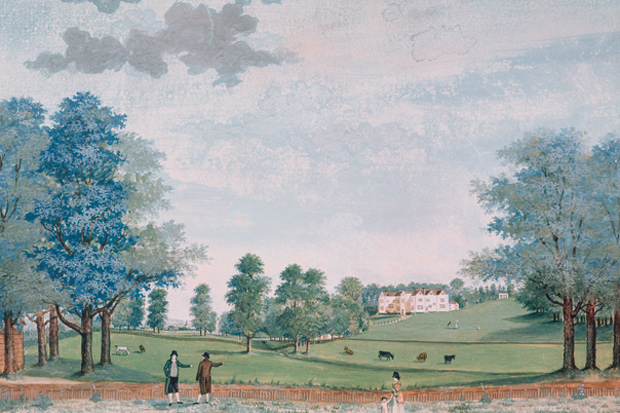‘Life is bristling with thorns,’ Voltaire observed in 1769, ‘and I know no other remedy than to cultivate one’s garden.’ This is the remedy espoused by Candide at the end of Voltaire’s satirical novel, published ten years earlier, and the literal and metaphorical cultivating of gardens is the subject of Damon Young’s sprightly and stimulating little book. Young examines the relationship between gardening and philosophy in the life and work of 11 writers, from the 18th to the 20th century, topping and tailing these individual essays with a consideration of the Ancient Greeks.
What he calls the ‘plein-air tradition of philosophy’ starts with Aristotle giving lectures in the Lyceum, a park which included not only sports facilities and temples but the world’s first botanical garden. Gardens have always offered a retreat in which to think, often while taking gentle exercise at the same time, but Young argues that one reason they are intellectually stimulating is that they are ‘a fusion of two fundamental philosophical principles: humanity and nature’.
He sees Voltaire’s garden at Ferney as ‘a bold metaphor for compassion, responsibility and pragmatism — a call to improve his immediate surroundings’: ‘Ferney required practical expertise, continual labour and devotion. And likewise for civil institutions: the estate stood for France as a whole, which deserved to be governed wisely, benevolently and tolerantly.’
For Rousseau, the cultivation of plants was less important than the close study of them. Botany provides ‘a lesson in precise, pleasurable perception. And in this, it is a remedy for the numbed consciousness of civilised life.’ By contrast, the natural world induced visceral distaste in Jean-Paul Sartre. A stroll in the park for the protagonist of Nauséa leads to appalled contemplation of the meaningless vegetable life of a chestnut tree:
I slumped on the bench, dazed, stunned by that profusion of beings without origin: bloomings, blossomings everywhere, my ears were buzzing with existence, my very flesh was throbbing and opening, abandoning itself to the universal burgeoning, it was repulsive.
While Young depicts Friederich Nietzsche ‘muttering to himself’ beneath a lemon tree in Sorrento and Nikos Kazantzakis contemplating a Japanese karesansui rock garden at a Buddhist temple in Kyoto, the other writers he discusses are not principally philosophers. He nevertheless nimbly demonstrates how their worldview was influenced by plants and gardening. One aspect of the temps perdu that Proust attempted to recover through memory was the hawthorn-hedged countryside and extensive gardens of his childhood. Chronic asthma prevented him from enjoying such things as an adult, except when driven in a sealed car to look at spring blossom. He did, however, acquire three bonsai which for Young are closely associated with his masterpiece, ‘a salute to the vastness evoked by small things’.
The same could be said of Emily Dickinson, for whom spring bulbs not only provided ‘a cosmological and existentialist message’, but also an example of the sort of ‘feats of compression’ that characterised her poetry. Young sensibly acknowledges that Colette ‘was not aiming at philosophical consistency in her life and writing’, but argues that while her greed for food and sex left her unsated, ‘plants helped to rid her of desire altogether; helped her to become less starved and more contemplative’. By way of contrast, the grounds at Pemberley in Pride and Prejudice are for Young less representative of ‘wealth and status’ than the kind of ‘harmony and order’ that Jane Austen sought in both her life and work.
The best chapters concern George Orwell and Leonard Woolf, who didn’t just mooch about in gardens but really got their hands dirty. The tubercular Orwell more or less gardened himself to death on Jura, not only because he believed in self-sufficiency as a moral good, but because the hard graft it required was a metaphor for his life’s work as a writer and thinker: ‘He did not want to escape from reality; he wanted to dwell in facts, however painful’. Horticulture ‘is first and foremost a realist’s enterprise’ and therefore reflected Orwell’s literary method. The similarly austere Woolf had learned in Burma how easily untamed nature could swarm destructively over everything, and this provided a metaphor for a world in which meaningless chaos and rational order did constant battle.
The garden [at Rodmell] was his personal struggle with a conflicted but beloved cosmos. It would not last, and neither would he. But it was worth holding onto, for precisely the reason books were worth reading and writing: a clearer, saner, more honest life.
Think about that next time you have to do some weeding.






Comments